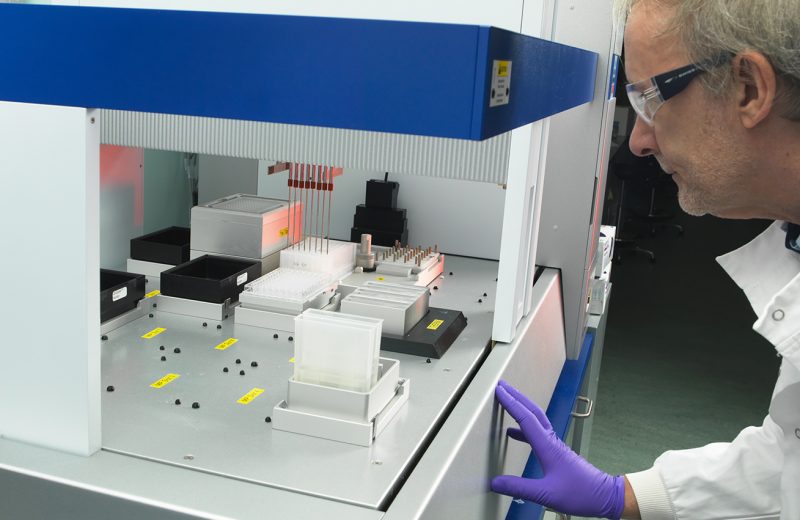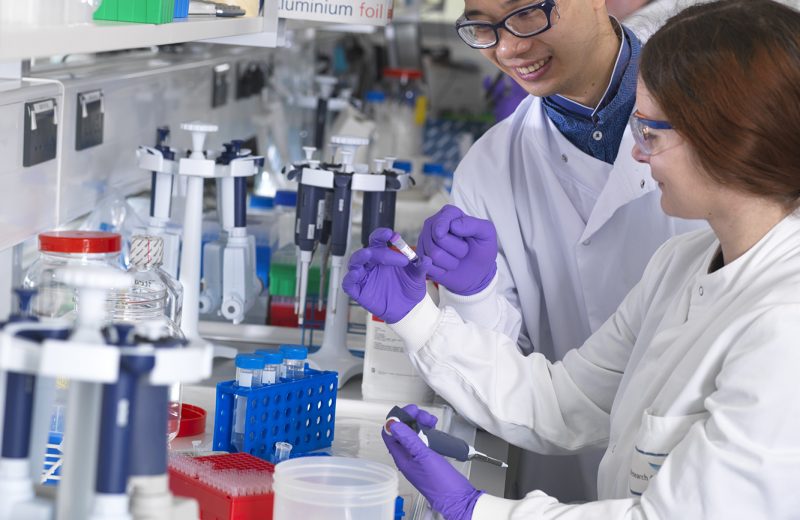Science Minister Hails Nanobody Breakthrough at Franklin
Researchers from Protein Production UK, a collaborative project led by The Rosalind Franklin Institute, have isolated nanobodies – a type of antibody used in research, which bind to the ‘spike’ protein of the SARS-CoV-2 virus.
The team have already made these nanobodies, which bind with high affinity to the ‘spike’ protein, available to researchers at The University of Oxford. They will be making these important research tools widely available to other research groups around the world.
Science Minister, Amanda Solloway, said: “Our world-leading scientists and researchers are working as quickly as possible to find treatments that combat coronavirus, and collaboration between research institutions, universities and industry is critical to achieving this. This ground-breaking discovery by the Rosalind Franklin Institute is an important step in finding a treatment or vaccine for coronavirus, helping to save people’s lives.”
Nanobodies are antibodies found in camelids (llamas, alpacas and camels), which are much smaller than human antibodies. Their high stability, small structure, and specificity makes them ideal for the purification and stabilisation of proteins and protein structures, prior to imaging.

The team at The Franklin are targeting their work at a protein which sits on the outside of the SARS-CoV-2 viral particle known as the ‘spike’, which binds to human cells during an infection. This protein has a specific area – the receptor binding domain (RBD) – which is responsible for this binding action. The protein is a major target in COVID-19 research, as it plays a pivotal role in infection and may be a strong target for future vaccines and therapies.
Nanobodies can stabilise the ‘spike’ to enable better imaging at the atomic scale, using advanced imaging techniques including cryo-electron microscopy (cryo-EM). The nanobodies also enable the RBD to be stabilised bound to its target, helping researchers better understand how it behaves in the body, and how it might interact with new drugs.
The team are also investigating whether the nanobodies they identify, or therapies derived from them, could be used to create highly specific ‘blockers’, which could contribute to treatments for COVID-19, by preventing the SARS-CoV-2 virus from binding to human cells and causing infection. There is also potential in nanobodies for diagnostics, creating highly efficient and quick tests.
Professor James Naismith, Director of the Rosalind Franklin Institute explains: “One single protein often has multiple target sites (epitopes) for the human immune system to produce antibodies to bind to. When antibodies bind to certain epitopes they ‘neutralise’ the virus, this prevents further infection thus stopping the virus in its tracks. The tools that PPUK, a model for multi-partner collaborations, will make available will be helpful to scientists working on SARS-CoV-2 virus.”

Identifying which nanobodies have ‘binding’ and which have ‘binding and neutralising’ actions is a key next step for the group, and one which will see them search for a wider range of nanobodies, and compare their action to human antibodies derived from patient samples.
Professor Ray Owens, who leads Protein Production UK for The Franklin, says: “There is an unprecedented level of team-work and collaboration globally to image, understand, and treat COVID-19. We are working with colleagues at the University of Oxford to use the nanobodies developed here at The Franklin, to gain insights into the structure of the virus that causes COVID-19”
The Rosalind Franklin Institute is a new national research institute, funded by UK Research and Innovation through the Engineering and Physical Sciences Research Council. Its mission is to develop and apply disruptive new technologies in the physical and engineering sciences to transform the UK’s life science research and pharma sector.
About Protein Production UK
Protein Production UK (PPUK) is a project hosted by The Rosalind Franklin Institute in partnership with Diamond Light Source, the UK’s national synchrotron light source, (www.diamond.ac.uk), and is tasked with devising new ways to deliver ‘the right sample, at the right time, for the right experiment’. This involves improving existing technology and developing new methods, that will, enable the structural biology community to keep pace with the rapidly expanding range of tools available for analysis, using X-rays and electrons.
PPUK has established the nanobody discovery platform in The Franklin’s Structural Biology Theme, and the rapid production of these reagents for Covid 19 work by PPUK is proof of the strategic importance of such a facility in the UK.
PPUK is currently based at the Research Complex at Harwell www.rc-harwell.ac.uk
Diamond Light Source have created a page dedicated to their world leading research on COVID-19 – https://www.diamond.ac.uk/covid-19.html.
More information about Structural Biology Facilities across Europe focused on research into Covid 19 is available on https://instruct-eric.eu/covid19.
